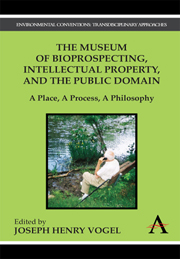 The Museum of Bioprospecting, Intellectual Property, and the Public Domain
The Museum of Bioprospecting, Intellectual Property, and the Public Domain Book contents
- Frontmatter
- Contents
- List of Figures
- Preface
- Acknowledgements
- Introduction: The Bauplan
- Chapter 1 Looking the Gorgon in the Face
- Chapter 2 Museums as Venues for Polemics
- Chapter 3 The Museum as a Vehicle for Considered Judgments on Access and Benefit Sharing
- Chapter 4 Clearing the Air: Applying the Intellectual Property Framework to National, Community, and Individual Rights in The Convention on Biological Diversity
- Chapter 5 The Anti-Commons Threat to Farmers' Rights: The Case of Crop Germplasm
- Chapter 6 The Moral Foundations of Intellectual Property and Conservation through Access and Benefit-Sharing
- Conclusions: The Nameless Interloper in The Museum of Bioprospecting, Intellectual Property, and the Public Domain
- Appendix: The Original Essay: A Proposal Based on “The Tragedy of the Commons:” Museum of Bioprospecting, Intellectual Property Rights, and the Public Domain
- Notes
- Index
- Frontmatter
- Contents
- List of Figures
- Preface
- Acknowledgements
- Introduction: The Bauplan
- Chapter 1 Looking the Gorgon in the Face
- Chapter 2 Museums as Venues for Polemics
- Chapter 3 The Museum as a Vehicle for Considered Judgments on Access and Benefit Sharing
- Chapter 4 Clearing the Air: Applying the Intellectual Property Framework to National, Community, and Individual Rights in The Convention on Biological Diversity
- Chapter 5 The Anti-Commons Threat to Farmers' Rights: The Case of Crop Germplasm
- Chapter 6 The Moral Foundations of Intellectual Property and Conservation through Access and Benefit-Sharing
- Conclusions: The Nameless Interloper in The Museum of Bioprospecting, Intellectual Property, and the Public Domain
- Appendix: The Original Essay: A Proposal Based on “The Tragedy of the Commons:” Museum of Bioprospecting, Intellectual Property Rights, and the Public Domain
- Notes
- Index
Summary
Knowing more and more about less and less is the hazard of advanced research. The Convention on Biological Diversity (CBD) is no exception. Since its ratification in 1993, a cottage industry has sprung up around the Conferences of the Parties (COP) to the CBD. Case studies, anthologies, and books have gushed forth to address the varied problems of bioprospecting, intellectual property, and the public domain. Nevertheless, the problems persist and even compound despite ever more case studies, anthologies, and books. Faith remains strong that technical solutions are still waiting to be found. Besides, the specialists will rationalize, non-technical solutions are not our bailiwick. Civil society must weigh in on the ethics and let us do our thing: flesh out the technical solutions.
What exactly are those ethics? How is civil society supposed to “weigh in?” Such unwelcome questions are not unique to bioprospecting, intellectual property, and the public domain. The French philosopher Jacques Ellul commented, “Everywhere we find men who pronounce as highly personal truths what they have read in the papers only an hour before, and whose beliefs are merely the result of a powerful propaganda“ (21). Any hope that civil society can express its values through the political process, Ellul felt, was equally unfounded:
Democracy is based on the concept that man is rational and capable of seeing clearly what is in his own interest, but the study of public opinion suggests this is a highly doubtful proposition… […]
- Type
- Chapter
- Information
- The Museum of Bioprospecting, Intellectual Property, and the Public DomainA Place, A Process, A Philosophy, pp. xi - xivPublisher: Anthem PressPrint publication year: 2010


